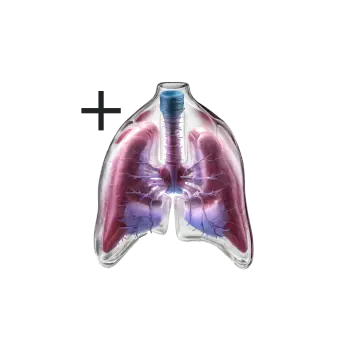What is Hashimoto's Disease?
Hashimoto's disease is an autoimmune condition in which the body's immune system attacks the thyroid gland, located at the front of the neck. The thyroid plays a crucial role in regulating the body's metabolism. This immune attack causes inflammation and often leads to an underactive thyroid, also known as hypothyroidism. As a result, the thyroid produces insufficient amounts of the thyroid hormones triiodothyronine (T3) and thyroxine (T4). In response, the body compensates by releasing higher concentrations of TSH (thyroid-stimulating hormone), a key mechanism in the disease and an important marker for diagnosis. The low levels of thyroid hormones affect various bodily functions and may lead to a range of symptoms and discomfort.
Causes of Hashimoto's Disease
The exact cause of Hashimoto's disease is not fully understood, but researchers have identified several factors that may contribute to its development:
Genetics: Heredity plays a significant role, and the disease is more common among individuals with a family history of autoimmune disorders.
Gender: Women are significantly more likely to develop Hashimoto's disease than men, suggesting that sex hormones may influence its onset.
Environmental factors: Stress, infections, and excessive iodine intake are potential triggers for the disease.
Age: Hashimoto's disease is often diagnosed in middle age but can occur at any age.
Symptoms of Hashimoto's Disease
Hashimoto's disease typically develops slowly and may initially be asymptomatic. As thyroid function declines over time, the following symptoms may appear:
Fatigue: A persistent feeling of low energy despite adequate sleep.
Weight gain: Unexplained weight increase even with a normal diet.
Cold sensitivity: Constantly feeling cold, even in warm environments.
Poor skin and hair quality: Dry skin, hair loss, and brittle nails.
Constipation: Digestive issues and slow bowel function.
Mood changes: Depression, irritability, or feelings of low mood.
Goiter: An enlarged thyroid gland that may cause visible swelling in the neck area.
Treatment of Hashimoto's Disease
There is no cure for Hashimoto's disease, but treatment aims to restore hormone balance and alleviate symptoms. Common treatment approaches include:
Hormone replacement therapy:
Levothyroxine, a synthetic form of the thyroid hormone T4, is the most common medication. It is taken daily, with dosage adjustments based on regular blood tests.
Lifestyle modifications:
A balanced diet rich in nutrients such as selenium, zinc, and iodine can support thyroid function. However, excessive iodine intake should be avoided.
Regular exercise can improve energy levels and counteract weight gain.
Stress management, through practices such as meditation or yoga, can reduce strain on the immune system.
Blood Tests for Diagnosing Hashimoto's Disease
To diagnose Hashimoto's disease, several blood tests are performed to evaluate thyroid function and identify autoimmune activity. Common tests include:
TSH (thyroid-stimulating hormone): Elevated TSH levels often indicate an underactive thyroid.
Free T4 and T3: These tests measure the levels of thyroid hormones in the blood. Low levels often confirm hypothyroidism.
Anti-TPO and Thyroglobulin antibodies: Elevated levels of these antibodies are characteristic of Hashimoto's disease and indicate an autoimmune attack on the thyroid.
If Hashimoto's disease is suspected, a comprehensive thyroid panel including thyroglobulin antibodies is recommended. These tests provide a detailed overview of thyroid function and potential autoimmunity.
Summary
Hashimoto's disease is a chronic autoimmune condition that affects the thyroid gland, leading to hypothyroidism. With proper diagnosis and treatment, symptoms can be effectively managed, allowing individuals to lead a healthy and balanced life. If you experience symptoms that may be related to Hashimoto's disease, it is important to seek medical attention for an accurate diagnosis and timely treatment.






















